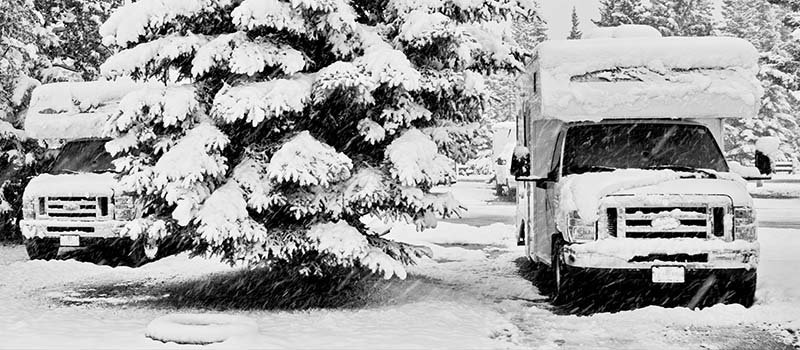Storing Your RV Battery Over The Winter
Storing Your RV Battery Over The Winter

Storing Your RV Battery Over The Winter
- When you remove your battery for the winter, clean off any corrosion around the terminals using a wire brush and appropriate cleaning products. Certain cleaning agents are made specifically for this purpose, so check with your service professional to make sure you’re using the safest, most effective product.
- Start with the battery fully charged. Check the battery voltage monthly, and charge it if the voltage falls below 80%.
- If you have a liquid electrolyte wet cell battery (also known as a flooded-cell battery), check the fluid levels. If you are already familiar with the process and are using proper safety gear, remove the vent caps and refill the levels with distilled water, if needed. Never use tap water, as the minerals in the water can cause buildup that causes damage to the battery.
- Store your battery in a dry location between 32 and 80 degrees Fahrenheit. Most professionals recommend sitting the battery on a piece of cardboard or carpet, so that it does not sit directly on the floor. In the event that your battery freezes, do not attempt to charge it immediately, as this can result in an explosion.
- If you plan to leave your battery in the RV over the winter, be sure to disconnect it to prevent the charge from draining. Small appliances, like radios, refrigerators, smoke detectors and propane detectors can drain your battery, even if they’re turned off. You can also install a battery disconnect switch, which can also help prevent battery power drain.
- Consider purchasing an RV battery monitor, which can easily tell you the exact charge of your battery. There are a wide variety of monitors available, ranging from simple models with LCD displays to more high-tech versions that send updates to your phone.
- Avoid keeping your RV plugged in at all times, as this can drain your wet-cell batteries’ water levels more quickly. Although you don’t want your battery power to get too low, keeping it constantly plugged in can also reduce your battery’s life. Some professionals recommend a “one week on, one week off” strategy of charging, alternating weeks between when your battery is plugged in and unplugged.
- Even if you own a trailer that also has a battery, be sure to properly maintain it as well, and remember to charge it properly.
Depending on your RV insurance policy, you may also have coverage in the event that your battery fails, but in most cases, standard RV policies do not include this extra protection. If you’re uncertain whether your current policy provides enough coverage for your needs, including protection for your battery, reach out to your local agent. They will use their extensive policy knowledge to help you get the policy specifically tailored to your needs.
